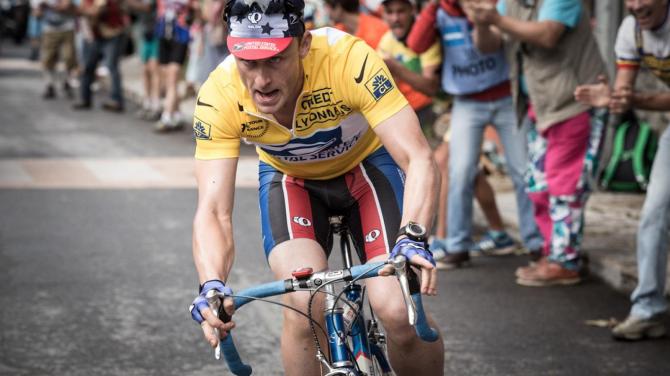Lance Armstrong film - 'The Program' review
More false bravado than pure Texan swagger

An adaption of David Walsh’s Seven Deadly Sins, the Steven Frears directed The Program is the latest contribution to the growing list in the Lance Armstrong spin-off since his admission to doping in 2013.
While The Program pays homage to Walsh’s book, this a film occupied with Armstrong and his exploits on and off the bike. Audiences will be left wanting more explanation, others dumbfounded by the Armstrong narrative and apparent ease at which he and his fellow cyclists cheated throughout their careers.
The film conveniently lays out the Armstrong narrative in chronologically order from a 1994 Fleche Wallone start line conversation with Johan Bruyneel who tells Armstrong he is not going to win the race. Cue the racing and a brief shot of the Gewiss trio, Moreno Argentin, Giorgio Furlan and Eugeni Berzin, riding to victory. Armstrong then appears to be racing one of the cobbled classics rather than in the Ardennes with the scene serving to demonstrate why Armstrong and his American teammates needed to get on the ‘program’ to compete in Europe.
The opening scenes set the template of The Program with introductions to characters of the cycling world but failing to explain their significance or place in the narrative. Walsh for example quickly becomes a bit player while US Postal riders are afforded as many lines of dialogue as they were opportunities to lead Grand Tour teams.
Armstrong’s cancer battle is treated in a similar fashion. It’s presented as series of famous events, ticking off the prognosis with the doctor; a surgery scene; the hospital scene with the Andreu's, and so on.
Armstrong’s time with Cofidis is another exclusion from the film as it sprints through the pre-Tour winning years with the audience left to fill in the gaps. Victory is secured for Armstrong at the ‘Tour of renewal’ with a procession of images and scenes and countless shots of Paris in July the visual clue for Armstrong seven Tour wins.
Disappointingly, Frears film ignores any rivalry Armstrong had with the likes of Jan Ullrich, Joseba Beloki or Ivan Basso creating the feeling that Armstrong simply had to turn up for victory. There are some nice recreations of the Tour but they feel far and few between.
The latest race content, interviews, features, reviews and expert buying guides, direct to your inbox!
Shots of riders injecting themselves before placing their needles in cans for rubbish collection on the team bus, motoman delivering vials throughout the Tour, Armstrong’s zip the lips gesture with Filippo Simeoni and similar treatment of Christophe Bassons are instead the focus of the racing scenes.
The films feels like a ’greatest hits’ of sorts in Armstrong’s career, we get the hits but with any such compilation, the complex gems tend to get the cut in favour of the radio friendly songs. Floyd Landis’ bitterness as he’s cast out in the cold for his positive test in 2006 is given equal, if not more, credence for bringing down his former teammate than Walsh, and others’, investigative work.
Adding to this, Armstrong’s blacklisting of journalists and lawsuits are dealt with in one short scene as he tells Stapleton “I will not be brought down.” You’d be forgiven if you forget the French cared about the race from the film or even covered it in any great detail in what is largely an American ideal of the Armstrong era.
Ben Foster is admirable in playing Armstrong and while there are moments he nails his glare and body language, without the psychological insight the script fails to deliver. The character of Landis on the other hand is given a little more time to breathe with his decision to leave behind his Mennonite family for a life as a doping cyclist, adding a certain moral fibre to the film.
The Program is going to attract audiences as a Hollywood blockbuster featuring several big name actors and for its subject of course. However it never really gets into the big ring, shifting through the events of Armstrong’s career without settling into a rhythm and unpacking any larger issue.
We know the story, there is no big surprise ending, so for the less invested that might be enough. For those who spent hours of their lives waiting on Armstrong for interviews or doping tests for example, the film leaves you wanting more, asking why the likes of Greg LeMond feature only briefly in the opening archival footage. Armstrong attracts viewers, he attracts attention and there is no denying this. The Program on the other hand comes up short with a sense of false bravado than pure Texas swagger.